Module 5 Lao She Teahouse Unit 3 Language in use 课件(共39张PPT)+内嵌音频
文档属性
| 名称 | Module 5 Lao She Teahouse Unit 3 Language in use 课件(共39张PPT)+内嵌音频 | 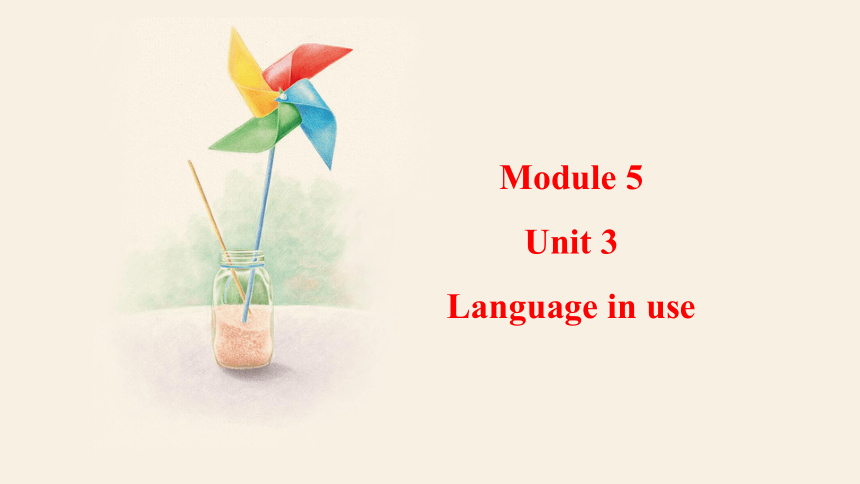 | |
| 格式 | pptx | ||
| 文件大小 | 14.1MB | ||
| 资源类型 | 教案 | ||
| 版本资源 | 外研版 | ||
| 科目 | 英语 | ||
| 更新时间 | 2023-12-30 09:40:12 | ||
图片预览

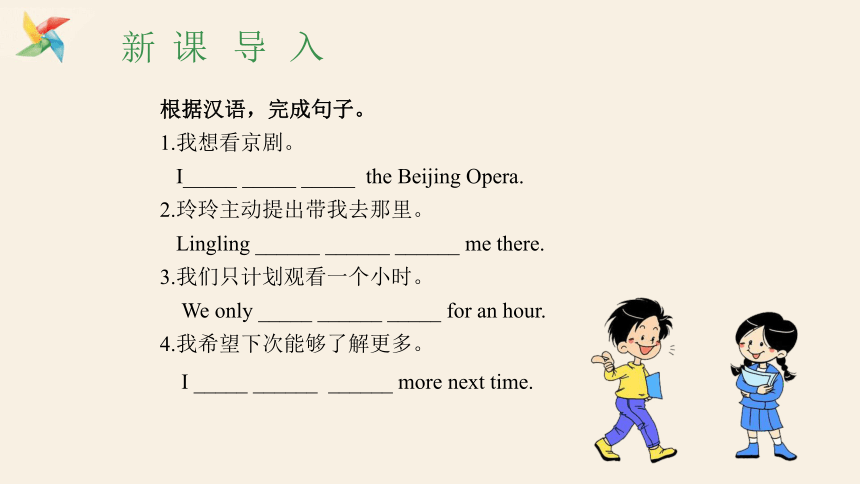
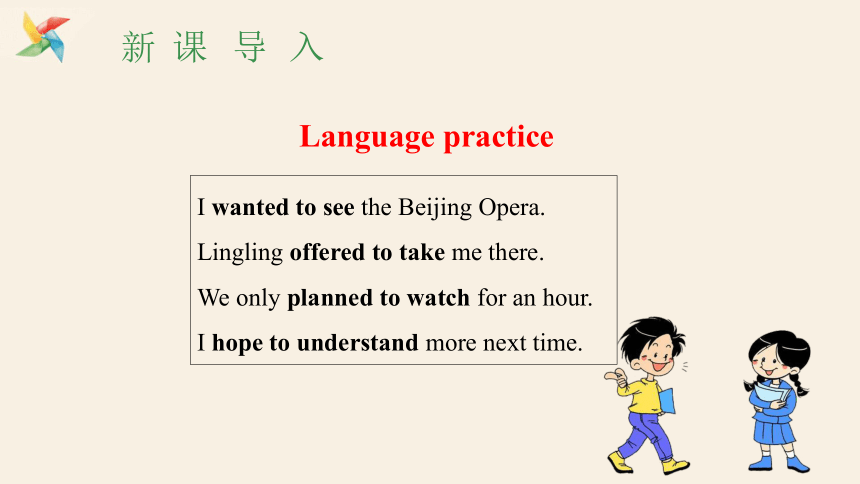
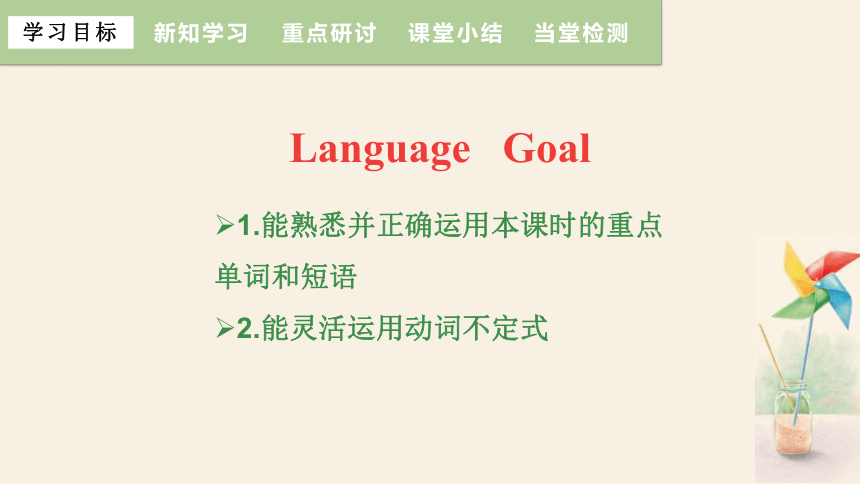
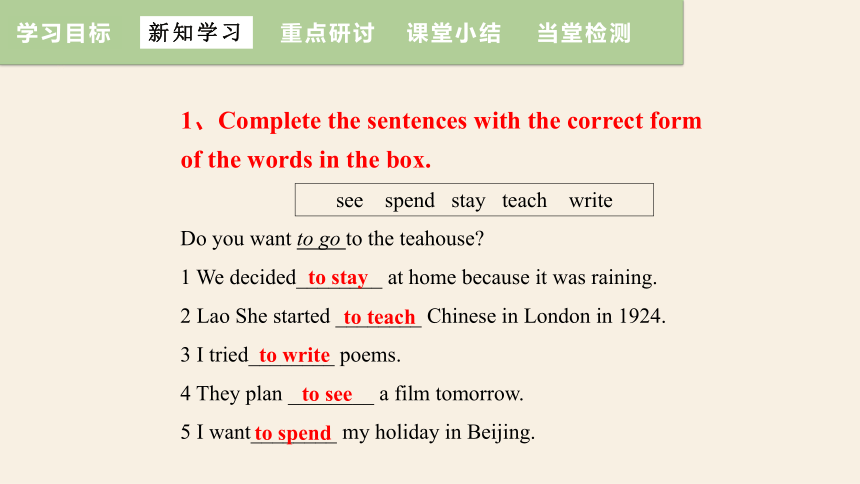
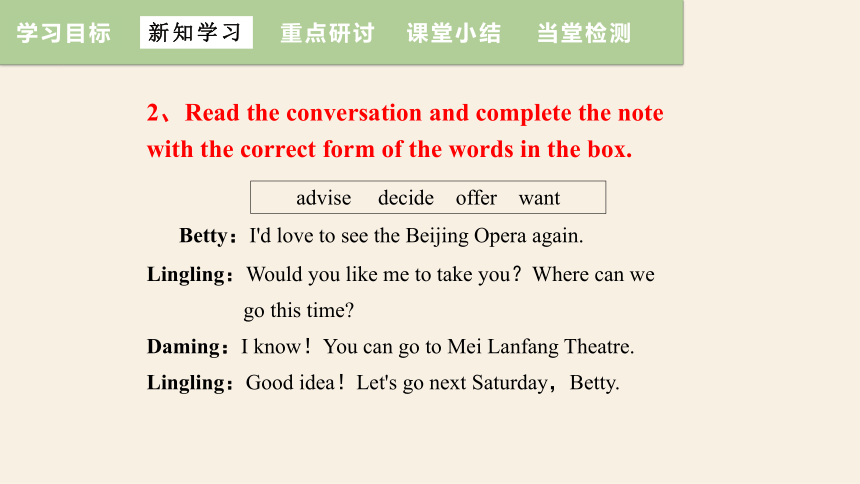
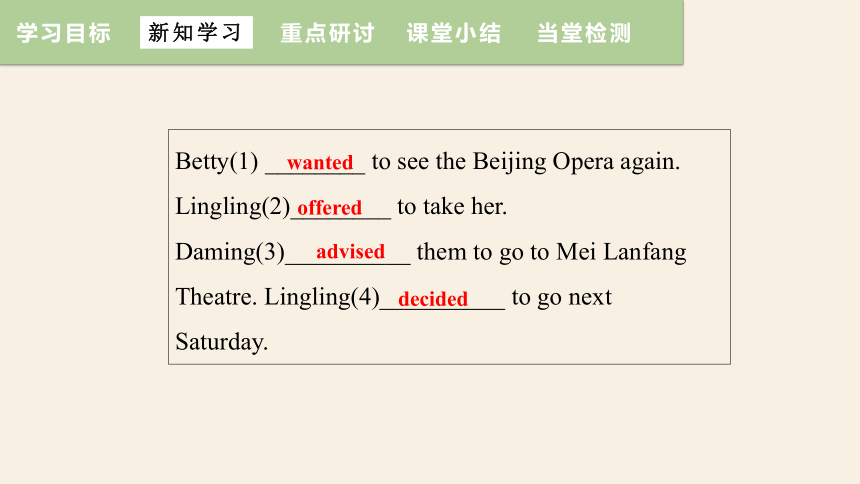
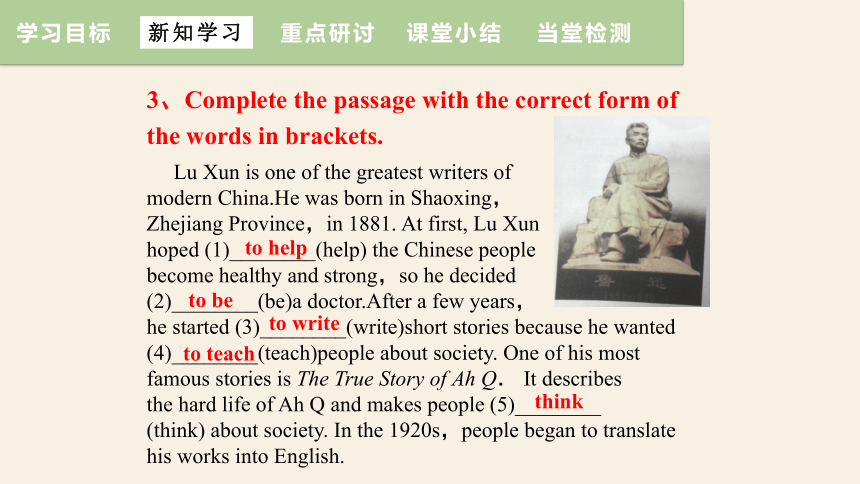
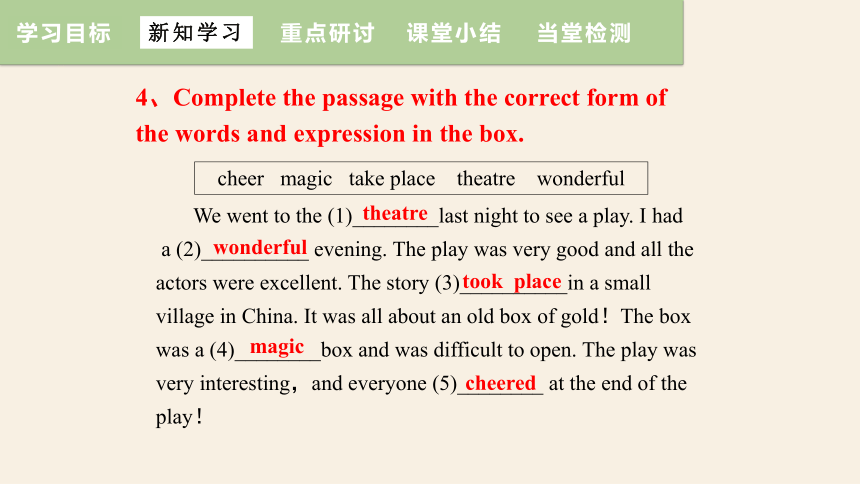
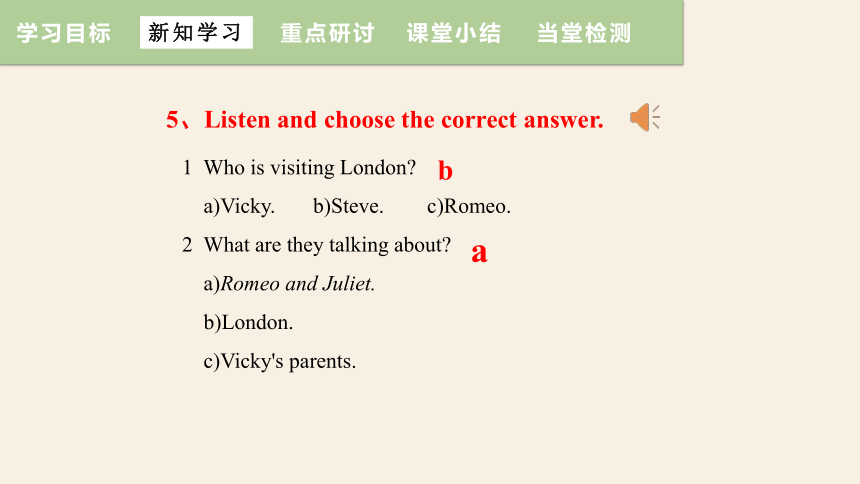
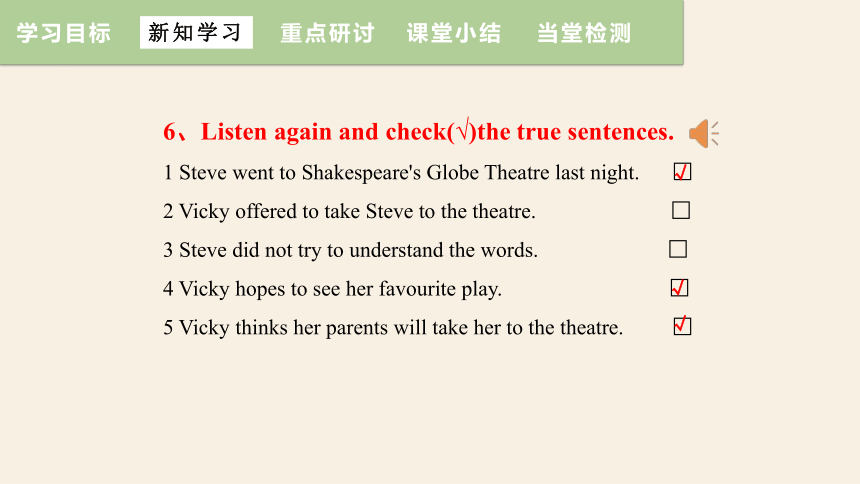

文档简介
(共39张PPT)
Module 5
Unit 3
Language in use
新
课
导
入
根据汉语,完成句子。
1.我想看京剧。
I_____ _____ _____ the Beijing Opera.
2.玲玲主动提出带我去那里。
Lingling ______ ______ ______ me there.
3.我们只计划观看一个小时。
We only _____ ______ _____ for an hour.
4.我希望下次能够了解更多。
I _____ ______ ______ more next time.
新
课
导
入
Language practice
I wanted to see the Beijing Opera.
Lingling offered to take me there.
We only planned to watch for an hour.
I hope to understand more next time.
Language Goal
新知学习
课堂小结
当堂检测
学习目标
重点研讨
1.能熟悉并正确运用本课时的重点
单词和短语
2.能灵活运用动词不定式
新知学习
课堂小结
当堂检测
学习目标
重点研讨
1、Complete the sentences with the correct form of the words in the box.
Do you want to go to the teahouse
1 We decided________ at home because it was raining.
2 Lao She started ________ Chinese in London in 1924.
3 I tried________ poems.
4 They plan ________ a film tomorrow.
5 I want________ my holiday in Beijing.
see spend stay teach write
to stay
to teach
to write
to see
to spend
新知学习
课堂小结
当堂检测
学习目标
重点研讨
2、Read the conversation and complete the note with the correct form of the words in the box.
Betty:I'd love to see the Beijing Opera again.
Lingling:Would you like me to take you?Where can we
go this time
Daming:I know!You can go to Mei Lanfang Theatre.
Lingling:Good idea!Let's go next Saturday,Betty.
advise decide offer want
新知学习
课堂小结
当堂检测
学习目标
重点研讨
Betty(1) ________ to see the Beijing Opera again. Lingling(2)________ to take her. Daming(3)__________ them to go to Mei Lanfang Theatre. Lingling(4)__________ to go next
Saturday.
wanted
offered
advised
decided
新知学习
课堂小结
当堂检测
学习目标
重点研讨
Lu Xun is one of the greatest writers of
modern China.He was born in Shaoxing,
Zhejiang Province,in 1881. At first, Lu Xun
hoped (1)________(help) the Chinese people
become healthy and strong,so he decided
(2)________(be)a doctor.After a few years,
he started (3)________(write)short stories because he wanted
(4)________(teach)people about society. One of his most famous stories is The True Story of Ah Q. It describes
the hard life of Ah Q and makes people (5)________
(think) about society. In the 1920s,people began to translate
his works into English.
3、Complete the passage with the correct form of the words in brackets.
to teach
to write
to be
to help
think
新知学习
课堂小结
当堂检测
学习目标
重点研讨
4、Complete the passage with the correct form of the words and expression in the box.
We went to the (1)________last night to see a play. I had
a (2)__________ evening. The play was very good and all the actors were excellent. The story (3)__________in a small village in China. It was all about an old box of gold!The box was a (4)________box and was difficult to open. The play was very interesting,and everyone (5)________ at the end of the play!
cheer magic take place theatre wonderful
magic
took place
wonderful
theatre
cheered
新知学习
课堂小结
当堂检测
学习目标
重点研讨
5、Listen and choose the correct answer.
1 Who is visiting London
a)Vicky. b)Steve. c)Romeo.
2 What are they talking about
a)Romeo and Juliet.
b)London.
c)Vicky's parents.
a
b
新知学习
课堂小结
当堂检测
学习目标
重点研讨
6、Listen again and check(√)the true sentences.
1 Steve went to Shakespeare's Globe Theatre last night. □
2 Vicky offered to take Steve to the theatre. □
3 Steve did not try to understand the words. □
4 Vicky hopes to see her favourite play. □
5 Vicky thinks her parents will take her to the theatre. □
√
√
√
新知学习
课堂小结
当堂检测
学习目标
重点研讨
Vicky: Hello, Steve. Are you enjoying your visit to London
Steve: Thank you for asking, Vicky. I’m having a great time.
We went to Shakespeare’s Globe Theatre last night.
Vicky: Oh yes, it’s great. A lot of tourists want to go there.
Steve: Yes, my uncle offered to take us, and we decided to see
Romeo and Juliet.
Vicky: Hello, Steve. Are you enjoying your visit to London
Steve: Thank you for asking, Vicky. I’m having a great time.
We went to Shakespeare’s Globe Theatre last night.
Vicky: Oh yes, it’s great. A lot of tourists want to go there.
Steve: Yes, my uncle offered to take us, and we decided to see
Romeo and Juliet.
听力材料
新知学习
课堂小结
当堂检测
学习目标
重点研讨
Vicky: Hello, Steve. Are you enjoying your visit to London
Steve: Thank you for asking, Vicky. I’m having a great time.
We went to Shakespeare’s Globe Theatre last night.
Vicky: Oh yes, it’s great. A lot of tourists want to go there.
Steve: Yes, my uncle offered to take us, and we decided to see
Romeo and Juliet.
Vicky: Did you understand the play
Steve: Well, I tried to understand the words. It was very
difficult. But I know the story.
Vicky: I hope to see Romeo and Juliet too. It’s my
favourite play.
Steve: Will your parents agree to take you
Vicky: Yes, I’m sure they will.
听力材料
新知学习
课堂小结
当堂检测
学习目标
重点研讨
7、Work in pairs.Talk about your weekend plans.Use the words and expressions in the box to help you.
hope how about let's want
why don't we why not would like
— I want to see the Beijing Opera.
— Why don't we...
— I want to see the Beijing opera.
— Why don't we go to Mei Lanfang Theatre
— Good idea . I'd like to go there.
— So why not go there now
— Sorry,I am busy. How about tomorrow afternoon
— OK. Let's make it. I hope to see a wonderful opera.
例文:
新知学习
课堂小结
当堂检测
学习目标
重点研讨
8、Read the passage and choose the correct answer.
Review of Teahouse
By Li Daming
This year's school play was a very good choice.Teahouse, by Lao She, is famous and interesting.We learnt a lot about people's lives in China some one hundred years ago.The actors’ and actresses' clothes and the teahouse furniture were right for the first half of the twentieth century.The actors and actresses all did a very good job. Li Nan, the student playing Wang Lifa, the owner of the teahouse, was the best. He brought Wang Lifa to life, from a young man to an old man.
I had a great time at the theatre. It was easy for everyone to understand the story and see the changes in Chinese society.
新知学习
课堂小结
当堂检测
学习目标
重点研讨
1 You would find the passage in .
a)a book
b)a school newspaper
c)a magazine
2 The writer .
a)liked the play b)did not like the play
c)did not say he liked the play or not
b
a
新知学习
课堂小结
当堂检测
学习目标
重点研讨
3 The actors and actresses in the play wore .
a)the same clothes as today
b)their best clothes
c)clothes of the first half of the twentieth century
4 Li Nan is .
a)a famous actor b)a student
c)an actress
c
b
新知学习
课堂小结
当堂检测
学习目标
重点研讨
Around the world
Theatres
Western theatre started in Greece, around 600 BC. The theatres were very big. About 15,000 people could watch a play at the same time. The audience sat on stone seats to watch the performances. Some of the theatres survive, as do some of the plays by ancient Greek writers. People still watch these plays today.
新知学习
课堂小结
当堂检测
学习目标
重点研讨
Module task:Acting out a scene from a play
Work in groups. Find a play.Think about these questions.
1 Where does it take place?
2 Who is in it?
3 What is the story?
4 What are the special moments in it?
新知学习
课堂小结
当堂检测
学习目标
重点研讨
10. Choose a scene and practise it.
11. Act out the scene in front of the class.
Language Points
新知学习
课堂小结
当堂检测
学习目标
重点研讨
知识点
1
bring...to life 意为“使……生动/鲜活”。
eg:His novels bring the Victoria age to life.
他的小说把维多利亚时代写活了。
bring...to life 还有“使苏醒”的意思。
eg:The doctor used a special way to bring the
patient to life.
医生用了一种特殊的方法使这位病人苏醒过来。
拓展
新知学习
课堂小结
当堂检测
学习目标
重点研讨
一、动词不定式
动词不定式是一种非谓语动词,在句中能作主语、宾语、定语、表语和宾语补足语。没有人称和数的变化,构成形式为to+动词原形。本模块介绍动词不定式置于谓语动词后作宾语,表明意图、计划、决定或希望。
动词不定式和双宾语
语法讲解
新知学习
课堂小结
当堂检测
学习目标
重点研讨
考点 1
跟不定式作宾语的动词
agree,ask,decide,choose,come,expect,hope,fail,happen,help,learn,mean,manage,offer,plan,promise,refuse,seem,wait,wish...
eg:The driver hoped to see the opposite car in time.
司机希望及时看见对面的小汽车。
I want to know the answer to your question.
我想知道你那道问题的答案。
新知学习
课堂小结
当堂检测
学习目标
重点研讨
考点 2
do+it+adj.+to do当复合宾语中的宾语是不定式时,先用形式宾语it代替不定式,把不定式置于补语之后,可以接此类复合宾语的动词有:
find,think,make,believe,keep,consider...
eg:We think it quite important to learn a foreign
language well.
我们认为学好一门外语相当重要。
新知学习
课堂小结
当堂检测
学习目标
重点研讨
考点 3
既可接动词不定式又可接动词的 ing形式作宾语,意思差别不太大的动词有:begin, start, continue等。
eg:Then I started watching/ to watch TV.
然后我开始看电视。
新知学习
课堂小结
当堂检测
学习目标
重点研讨
考点 4
后接动词不定式或动词的 ing形式作宾语,意思差别较大的动词有:
stop to do 停止,中断做某事后去做另一件事 He stops to smoke a cigarette.
他停下来,抽了根烟。
doing 停止做某事 I must stop smoking.
我必须戒烟了。
forget to do 忘记要去做某事 The light in the office is still on. He forgot to turn it off.
办公室的灯还亮着,他忘记关了。(没有做关灯的动作)
doing 忘记做过某事 He forgot turning the light off.
他忘记他已经关了灯了。(已做过关灯的动作)
新知学习
课堂小结
当堂检测
学习目标
重点研讨
remember to do 记得去做某事 Remember to go to the post office after school. 记着放学后去趟邮局。
doing 记得做过某事 Don't you remember seeing the man before?
你不记得以前见过那个人吗?
try to do 努力,企图做某事 You must try to be more careful.
你可要多加小心。
doing 试着做某事 I tried gardening but didn't succeed.
我试着种果木花卉,但未成功。
新知学习
课堂小结
当堂检测
学习目标
重点研讨
go on to do 做了一件事后,接着做另一件事 After he had finished his math,he went on to do his physics.
做完数学后,他接着去做物理。
doing 继续或不间断地做某事 They went on working till late in the night.他们不停地工作,一直到深夜。
感官 动词 (see, watch, observe, notice do 表示动作的完整性 I saw him work in the garden yesterday.
昨天我看见他在花园里干活。
(强调看见的整个过程)
doing 表示动作的进行性 I saw him working in the garden yesterday.昨天我见他正在花园里干活。
(强调“我见他正干活”这个动作)
新知学习
课堂小结
当堂检测
学习目标
重点研讨
begin/ start to do begin, start用于进行时态的句子中时,后面动词用不定式 I was beginning to get angry.我开始生起气来。
后接know, understand, realize这类动词时,常用不定式to do I begin to understand the truth.我开始明白真相。
事物作主语时 The snow began to melt.
雪开始融化了。
begin/ start doing 谈及一项长期活动或开始一种习惯时 How old were you when you started playing the piano?
你几岁时开始弹钢琴?
新知学习
课堂小结
当堂检测
学习目标
重点研讨
考点 5
动词不定式的否定式
不定式的否定式是“not / never to do...”,
不带to的不定式的否定式是“not / never do...”。
eg:Sometimes they have disagreements, and
decide not to talk to each other.
有时他们有分歧,会决定不对彼此谈论。
His parents tell him never to drive after he drinks.
他的父母告诉他不要酒后驾驶。
新知学习
课堂小结
当堂检测
学习目标
重点研讨
有些及物动词可接两个宾语(双宾语),即指人的间接宾语和指物的直接宾语。间接宾语通常放在直接宾语之前,若将间接宾语置于直接宾语之后,则要用介词to 或 for。
二、双宾语
新知学习
课堂小结
当堂检测
学习目标
重点研讨
考点 1
双宾语易位时需借助介词to的常用动词
bring sb.sth.=bring sth.to sb.把某物带给某人
hand sb.sth.=hand sth.to sb.把某物递给某人
lend sb.sth.=lend sth.to sb.把某物借给某人
mail sb.sth.=mail sth.to sb.把某物寄给某人
offer sb.sth.=offer sth.to sb.将某物提供给某人
pass sb.sth.=pass sth.to sb.把某物递给某人
pay sb.sth.=pay sth.to sb.付给某人某物(钱)
post sb.sth.=post sth.to sb.把某物寄给某人
新知学习
课堂小结
当堂检测
学习目标
重点研讨
return sb.sth.=return sth.to sb.把某物还给某人
send sb.sth.=send sth.to sb.把某物寄给某人
sell sb.sth.=sell sth.to sb.把某物卖给某人
serve sb.sth.=serve sth.to sb.把某物提供给某人
show sb.sth.=show sth.to sb.拿某物给某人看
take sb.sth.=take sth.to sb.把某物拿给某人
teach sb.sth.=teach sth.to sb.教某人某事
tell sb.sth.=tell sth.to sb.告诉某人某事
throw sb.sth.=throw sth.to sb.把某物扔给某人
write sb.sth.=write sth.to sb.给某人写……
新知学习
课堂小结
当堂检测
学习目标
重点研讨
考点 2
双宾语易位时需借助介词for的常用动词
book sb.sth.=book sth.for sb.为某人预订某物
buy sb.sth.=buy sth.for sb.为某人买某物
cook sb.sth.=cook sth.for sb.为某人烹饪某物
draw sb.sth.=draw sth.for sb.为某人画某物
get sb.sth.=get sth.for sb.为某人拿来某物
make sb.sth.=make sth.for sb.为某人做某物
pick sb.sth.=pick sth.for sb.为某人采摘某物
prepare sb.sth.=prepare sth.for sb.为某人准备某物
新知学习
课堂小结
当堂检测
学习目标
重点研讨
eg:She passed him the salt.
=She passed the salt to him.
她把盐递给了他。
Her uncle bought her an English Chinese dictionary yesterday.
=Her uncle bought an English Chinese dictionary for her yesterday.
昨天,她叔叔给她买了一本英汉词典。
新知学习
课堂小结
当堂检测
学习目标
重点研讨
考点 3
当直接宾语是人称代词(it/them),间接宾语是名词时;或两个宾语都是人称代词时,通常要用介词to或for引起的短语。
eg:The watch is Li Lei's. Please give it to him.
这块手表是李雷的。请把它给他。
新知学习
重点研讨
课堂小结
当堂检测
学习目标
Module 5 Unit 3
重点短语:bring...to life、have a great/good time
重点语法:动词不定式和双宾语
用所给动词的适当形式填空。
1. Bruce agreed his brother to play the guitar.(teach)
2. —I didn't hear you come in just now.
—That's good. We tried any noise, for you were sleeping. (make)
新知学习
课堂小结
当堂检测
学习目标
重点研讨
to teach
not to make
新知学习
课堂小结
当堂检测
学习目标
重点研讨
3. Mr. Zhao usually believes it relaxing_________the students in class. ( teach)
4. —Dad, why must I stop computer games?
—For your health, my boy. (play)
5. I always tell my students on the road because it's really dangerous. (play)
to teach
playing
not to play
Module 5
Unit 3
Language in use
新
课
导
入
根据汉语,完成句子。
1.我想看京剧。
I_____ _____ _____ the Beijing Opera.
2.玲玲主动提出带我去那里。
Lingling ______ ______ ______ me there.
3.我们只计划观看一个小时。
We only _____ ______ _____ for an hour.
4.我希望下次能够了解更多。
I _____ ______ ______ more next time.
新
课
导
入
Language practice
I wanted to see the Beijing Opera.
Lingling offered to take me there.
We only planned to watch for an hour.
I hope to understand more next time.
Language Goal
新知学习
课堂小结
当堂检测
学习目标
重点研讨
1.能熟悉并正确运用本课时的重点
单词和短语
2.能灵活运用动词不定式
新知学习
课堂小结
当堂检测
学习目标
重点研讨
1、Complete the sentences with the correct form of the words in the box.
Do you want to go to the teahouse
1 We decided________ at home because it was raining.
2 Lao She started ________ Chinese in London in 1924.
3 I tried________ poems.
4 They plan ________ a film tomorrow.
5 I want________ my holiday in Beijing.
see spend stay teach write
to stay
to teach
to write
to see
to spend
新知学习
课堂小结
当堂检测
学习目标
重点研讨
2、Read the conversation and complete the note with the correct form of the words in the box.
Betty:I'd love to see the Beijing Opera again.
Lingling:Would you like me to take you?Where can we
go this time
Daming:I know!You can go to Mei Lanfang Theatre.
Lingling:Good idea!Let's go next Saturday,Betty.
advise decide offer want
新知学习
课堂小结
当堂检测
学习目标
重点研讨
Betty(1) ________ to see the Beijing Opera again. Lingling(2)________ to take her. Daming(3)__________ them to go to Mei Lanfang Theatre. Lingling(4)__________ to go next
Saturday.
wanted
offered
advised
decided
新知学习
课堂小结
当堂检测
学习目标
重点研讨
Lu Xun is one of the greatest writers of
modern China.He was born in Shaoxing,
Zhejiang Province,in 1881. At first, Lu Xun
hoped (1)________(help) the Chinese people
become healthy and strong,so he decided
(2)________(be)a doctor.After a few years,
he started (3)________(write)short stories because he wanted
(4)________(teach)people about society. One of his most famous stories is The True Story of Ah Q. It describes
the hard life of Ah Q and makes people (5)________
(think) about society. In the 1920s,people began to translate
his works into English.
3、Complete the passage with the correct form of the words in brackets.
to teach
to write
to be
to help
think
新知学习
课堂小结
当堂检测
学习目标
重点研讨
4、Complete the passage with the correct form of the words and expression in the box.
We went to the (1)________last night to see a play. I had
a (2)__________ evening. The play was very good and all the actors were excellent. The story (3)__________in a small village in China. It was all about an old box of gold!The box was a (4)________box and was difficult to open. The play was very interesting,and everyone (5)________ at the end of the play!
cheer magic take place theatre wonderful
magic
took place
wonderful
theatre
cheered
新知学习
课堂小结
当堂检测
学习目标
重点研讨
5、Listen and choose the correct answer.
1 Who is visiting London
a)Vicky. b)Steve. c)Romeo.
2 What are they talking about
a)Romeo and Juliet.
b)London.
c)Vicky's parents.
a
b
新知学习
课堂小结
当堂检测
学习目标
重点研讨
6、Listen again and check(√)the true sentences.
1 Steve went to Shakespeare's Globe Theatre last night. □
2 Vicky offered to take Steve to the theatre. □
3 Steve did not try to understand the words. □
4 Vicky hopes to see her favourite play. □
5 Vicky thinks her parents will take her to the theatre. □
√
√
√
新知学习
课堂小结
当堂检测
学习目标
重点研讨
Vicky: Hello, Steve. Are you enjoying your visit to London
Steve: Thank you for asking, Vicky. I’m having a great time.
We went to Shakespeare’s Globe Theatre last night.
Vicky: Oh yes, it’s great. A lot of tourists want to go there.
Steve: Yes, my uncle offered to take us, and we decided to see
Romeo and Juliet.
Vicky: Hello, Steve. Are you enjoying your visit to London
Steve: Thank you for asking, Vicky. I’m having a great time.
We went to Shakespeare’s Globe Theatre last night.
Vicky: Oh yes, it’s great. A lot of tourists want to go there.
Steve: Yes, my uncle offered to take us, and we decided to see
Romeo and Juliet.
听力材料
新知学习
课堂小结
当堂检测
学习目标
重点研讨
Vicky: Hello, Steve. Are you enjoying your visit to London
Steve: Thank you for asking, Vicky. I’m having a great time.
We went to Shakespeare’s Globe Theatre last night.
Vicky: Oh yes, it’s great. A lot of tourists want to go there.
Steve: Yes, my uncle offered to take us, and we decided to see
Romeo and Juliet.
Vicky: Did you understand the play
Steve: Well, I tried to understand the words. It was very
difficult. But I know the story.
Vicky: I hope to see Romeo and Juliet too. It’s my
favourite play.
Steve: Will your parents agree to take you
Vicky: Yes, I’m sure they will.
听力材料
新知学习
课堂小结
当堂检测
学习目标
重点研讨
7、Work in pairs.Talk about your weekend plans.Use the words and expressions in the box to help you.
hope how about let's want
why don't we why not would like
— I want to see the Beijing Opera.
— Why don't we...
— I want to see the Beijing opera.
— Why don't we go to Mei Lanfang Theatre
— Good idea . I'd like to go there.
— So why not go there now
— Sorry,I am busy. How about tomorrow afternoon
— OK. Let's make it. I hope to see a wonderful opera.
例文:
新知学习
课堂小结
当堂检测
学习目标
重点研讨
8、Read the passage and choose the correct answer.
Review of Teahouse
By Li Daming
This year's school play was a very good choice.Teahouse, by Lao She, is famous and interesting.We learnt a lot about people's lives in China some one hundred years ago.The actors’ and actresses' clothes and the teahouse furniture were right for the first half of the twentieth century.The actors and actresses all did a very good job. Li Nan, the student playing Wang Lifa, the owner of the teahouse, was the best. He brought Wang Lifa to life, from a young man to an old man.
I had a great time at the theatre. It was easy for everyone to understand the story and see the changes in Chinese society.
新知学习
课堂小结
当堂检测
学习目标
重点研讨
1 You would find the passage in .
a)a book
b)a school newspaper
c)a magazine
2 The writer .
a)liked the play b)did not like the play
c)did not say he liked the play or not
b
a
新知学习
课堂小结
当堂检测
学习目标
重点研讨
3 The actors and actresses in the play wore .
a)the same clothes as today
b)their best clothes
c)clothes of the first half of the twentieth century
4 Li Nan is .
a)a famous actor b)a student
c)an actress
c
b
新知学习
课堂小结
当堂检测
学习目标
重点研讨
Around the world
Theatres
Western theatre started in Greece, around 600 BC. The theatres were very big. About 15,000 people could watch a play at the same time. The audience sat on stone seats to watch the performances. Some of the theatres survive, as do some of the plays by ancient Greek writers. People still watch these plays today.
新知学习
课堂小结
当堂检测
学习目标
重点研讨
Module task:Acting out a scene from a play
Work in groups. Find a play.Think about these questions.
1 Where does it take place?
2 Who is in it?
3 What is the story?
4 What are the special moments in it?
新知学习
课堂小结
当堂检测
学习目标
重点研讨
10. Choose a scene and practise it.
11. Act out the scene in front of the class.
Language Points
新知学习
课堂小结
当堂检测
学习目标
重点研讨
知识点
1
bring...to life 意为“使……生动/鲜活”。
eg:His novels bring the Victoria age to life.
他的小说把维多利亚时代写活了。
bring...to life 还有“使苏醒”的意思。
eg:The doctor used a special way to bring the
patient to life.
医生用了一种特殊的方法使这位病人苏醒过来。
拓展
新知学习
课堂小结
当堂检测
学习目标
重点研讨
一、动词不定式
动词不定式是一种非谓语动词,在句中能作主语、宾语、定语、表语和宾语补足语。没有人称和数的变化,构成形式为to+动词原形。本模块介绍动词不定式置于谓语动词后作宾语,表明意图、计划、决定或希望。
动词不定式和双宾语
语法讲解
新知学习
课堂小结
当堂检测
学习目标
重点研讨
考点 1
跟不定式作宾语的动词
agree,ask,decide,choose,come,expect,hope,fail,happen,help,learn,mean,manage,offer,plan,promise,refuse,seem,wait,wish...
eg:The driver hoped to see the opposite car in time.
司机希望及时看见对面的小汽车。
I want to know the answer to your question.
我想知道你那道问题的答案。
新知学习
课堂小结
当堂检测
学习目标
重点研讨
考点 2
do+it+adj.+to do当复合宾语中的宾语是不定式时,先用形式宾语it代替不定式,把不定式置于补语之后,可以接此类复合宾语的动词有:
find,think,make,believe,keep,consider...
eg:We think it quite important to learn a foreign
language well.
我们认为学好一门外语相当重要。
新知学习
课堂小结
当堂检测
学习目标
重点研讨
考点 3
既可接动词不定式又可接动词的 ing形式作宾语,意思差别不太大的动词有:begin, start, continue等。
eg:Then I started watching/ to watch TV.
然后我开始看电视。
新知学习
课堂小结
当堂检测
学习目标
重点研讨
考点 4
后接动词不定式或动词的 ing形式作宾语,意思差别较大的动词有:
stop to do 停止,中断做某事后去做另一件事 He stops to smoke a cigarette.
他停下来,抽了根烟。
doing 停止做某事 I must stop smoking.
我必须戒烟了。
forget to do 忘记要去做某事 The light in the office is still on. He forgot to turn it off.
办公室的灯还亮着,他忘记关了。(没有做关灯的动作)
doing 忘记做过某事 He forgot turning the light off.
他忘记他已经关了灯了。(已做过关灯的动作)
新知学习
课堂小结
当堂检测
学习目标
重点研讨
remember to do 记得去做某事 Remember to go to the post office after school. 记着放学后去趟邮局。
doing 记得做过某事 Don't you remember seeing the man before?
你不记得以前见过那个人吗?
try to do 努力,企图做某事 You must try to be more careful.
你可要多加小心。
doing 试着做某事 I tried gardening but didn't succeed.
我试着种果木花卉,但未成功。
新知学习
课堂小结
当堂检测
学习目标
重点研讨
go on to do 做了一件事后,接着做另一件事 After he had finished his math,he went on to do his physics.
做完数学后,他接着去做物理。
doing 继续或不间断地做某事 They went on working till late in the night.他们不停地工作,一直到深夜。
感官 动词 (see, watch, observe, notice do 表示动作的完整性 I saw him work in the garden yesterday.
昨天我看见他在花园里干活。
(强调看见的整个过程)
doing 表示动作的进行性 I saw him working in the garden yesterday.昨天我见他正在花园里干活。
(强调“我见他正干活”这个动作)
新知学习
课堂小结
当堂检测
学习目标
重点研讨
begin/ start to do begin, start用于进行时态的句子中时,后面动词用不定式 I was beginning to get angry.我开始生起气来。
后接know, understand, realize这类动词时,常用不定式to do I begin to understand the truth.我开始明白真相。
事物作主语时 The snow began to melt.
雪开始融化了。
begin/ start doing 谈及一项长期活动或开始一种习惯时 How old were you when you started playing the piano?
你几岁时开始弹钢琴?
新知学习
课堂小结
当堂检测
学习目标
重点研讨
考点 5
动词不定式的否定式
不定式的否定式是“not / never to do...”,
不带to的不定式的否定式是“not / never do...”。
eg:Sometimes they have disagreements, and
decide not to talk to each other.
有时他们有分歧,会决定不对彼此谈论。
His parents tell him never to drive after he drinks.
他的父母告诉他不要酒后驾驶。
新知学习
课堂小结
当堂检测
学习目标
重点研讨
有些及物动词可接两个宾语(双宾语),即指人的间接宾语和指物的直接宾语。间接宾语通常放在直接宾语之前,若将间接宾语置于直接宾语之后,则要用介词to 或 for。
二、双宾语
新知学习
课堂小结
当堂检测
学习目标
重点研讨
考点 1
双宾语易位时需借助介词to的常用动词
bring sb.sth.=bring sth.to sb.把某物带给某人
hand sb.sth.=hand sth.to sb.把某物递给某人
lend sb.sth.=lend sth.to sb.把某物借给某人
mail sb.sth.=mail sth.to sb.把某物寄给某人
offer sb.sth.=offer sth.to sb.将某物提供给某人
pass sb.sth.=pass sth.to sb.把某物递给某人
pay sb.sth.=pay sth.to sb.付给某人某物(钱)
post sb.sth.=post sth.to sb.把某物寄给某人
新知学习
课堂小结
当堂检测
学习目标
重点研讨
return sb.sth.=return sth.to sb.把某物还给某人
send sb.sth.=send sth.to sb.把某物寄给某人
sell sb.sth.=sell sth.to sb.把某物卖给某人
serve sb.sth.=serve sth.to sb.把某物提供给某人
show sb.sth.=show sth.to sb.拿某物给某人看
take sb.sth.=take sth.to sb.把某物拿给某人
teach sb.sth.=teach sth.to sb.教某人某事
tell sb.sth.=tell sth.to sb.告诉某人某事
throw sb.sth.=throw sth.to sb.把某物扔给某人
write sb.sth.=write sth.to sb.给某人写……
新知学习
课堂小结
当堂检测
学习目标
重点研讨
考点 2
双宾语易位时需借助介词for的常用动词
book sb.sth.=book sth.for sb.为某人预订某物
buy sb.sth.=buy sth.for sb.为某人买某物
cook sb.sth.=cook sth.for sb.为某人烹饪某物
draw sb.sth.=draw sth.for sb.为某人画某物
get sb.sth.=get sth.for sb.为某人拿来某物
make sb.sth.=make sth.for sb.为某人做某物
pick sb.sth.=pick sth.for sb.为某人采摘某物
prepare sb.sth.=prepare sth.for sb.为某人准备某物
新知学习
课堂小结
当堂检测
学习目标
重点研讨
eg:She passed him the salt.
=She passed the salt to him.
她把盐递给了他。
Her uncle bought her an English Chinese dictionary yesterday.
=Her uncle bought an English Chinese dictionary for her yesterday.
昨天,她叔叔给她买了一本英汉词典。
新知学习
课堂小结
当堂检测
学习目标
重点研讨
考点 3
当直接宾语是人称代词(it/them),间接宾语是名词时;或两个宾语都是人称代词时,通常要用介词to或for引起的短语。
eg:The watch is Li Lei's. Please give it to him.
这块手表是李雷的。请把它给他。
新知学习
重点研讨
课堂小结
当堂检测
学习目标
Module 5 Unit 3
重点短语:bring...to life、have a great/good time
重点语法:动词不定式和双宾语
用所给动词的适当形式填空。
1. Bruce agreed his brother to play the guitar.(teach)
2. —I didn't hear you come in just now.
—That's good. We tried any noise, for you were sleeping. (make)
新知学习
课堂小结
当堂检测
学习目标
重点研讨
to teach
not to make
新知学习
课堂小结
当堂检测
学习目标
重点研讨
3. Mr. Zhao usually believes it relaxing_________the students in class. ( teach)
4. —Dad, why must I stop computer games?
—For your health, my boy. (play)
5. I always tell my students on the road because it's really dangerous. (play)
to teach
playing
not to play
同课章节目录
- Module 1 How to learn English
- Unit 1 Let's try to speak English as much as possi
- Unit 2 You should smile at her.
- Unit 3 Language in use .
- Module 2 My home town and my country
- Unit 1 It's taller than many other buildings.
- Unit 2 Cambridge is a beautiful city in the east o
- Unit 3 Language in use .
- Module 3 Sports.
- Unit 1 Nothing is more exciting than playing tenni
- Unit 2 This year we training more carefully.
- Unit 3 Language in use .
- Module 4 Planes, ships and trains .
- Unit 1 He lives the farthest from school.
- Unit 2 What is the best way to travel.
- Unit 3 Language in use .
- Module 5 Lao She Teahouse.
- Unit 1 I wanted to see the Beijing Opera.
- Unit 2 It descibes the changes in Chinese society.
- Unit 3 Language in use .
- Module 6 Animals in danger.
- Unit 1 It allows people to get closer to them .
- Unit 2 The WWF is working hard to save them all.
- Unit 3 Language in use .
- Revision module A
- Module 7 A famous story
- Unit 1 Alice was sitting with her sister by the ri
- Unit 2 She was thinking about her cat.
- Unit 3 Language in use .
- Module 8 Accidents
- Unit 1 While the car were changing to red, a car s
- Unit 2 I was trying to pick it up when it bite me
- Unit 3 Language in use .
- Module 9 Population
- Unit 1 The population of China is about 1.37 billi
- Unit 2 Arnwick was a city with 200,000 people.
- Unit 3 Language in use .
- Module 10 The weathe
- Unit 1 It might snow.
- Unit 2 The weather is fine all year round.
- Unit 3 Language in use .
- Module 11 Way of life
- Unit 1 In China ,we open a gift later.
- Unit 2 In England, you usually drink tea with milk
- Unit 3 Language in use .
- Module 12 Help
- Unit 1 What should we do before help arrives?
- Unit 2 Stay away from windows and heavy furniture.
- Unit 3 Language in use .
- Revision module B
